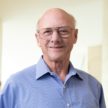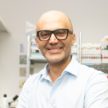THE PAUL F. GLENN CENTER FOR BIOLOGY OF AGING RESEARCH
Since it was founded in 1965 the Glenn Foundation for Medical Research has supported basic research to better understand the biology that governs normal human aging and related physiological decline, with the objective of developing interventions that will extend the healthy years of human life. The Buck Institute and the Glenn Foundation have partnered to create the Paul F. Glenn Center for Biology of Aging Research at the Buck Institute. The Center pursues up to eight projects at any one time focused on discovering mechanisms of aging and their relationship to chronic conditions of aging. Projects are interdisciplinary collaborations between at least two Center laboratories aimed at solving specific problems in research in aging and training talented postdoctoral fellows to become future leaders in the field.
The Glenn Medical Foundation co-sponsored the 30th anniversary of the biology of aging research symposium and continues to sponsor the Bay Area Aging Meeting (BAAM) and the Gordon Research Conference on the Biology of Aging
CENTER DETAILS
Eric Verdin, MD – Program Director
Malene Hansen, PhD – Chair
Gordon Lithgow, PhD – Committee Member
Jennifer Garrison, PhD – Committee Member
Juniper Pennypacker – Glenn Program Coordinator
-
 Julie Andersen, PhD Professor, Buck Institute
Julie Andersen, PhD Professor, Buck InstituteOn the road to new therapeutics for neurodegeneration, including Alzheimer’s and Parkinson’s disease.
JAndersen@buckinstitute.org
-
 Chris Benz, MD Professor, Buck Institute
Chris Benz, MD Professor, Buck InstituteUndertaking bench-to-bedside and community efforts to reduce the incidence of breast cancer and improve patient outcomes.
CBenz@buckinstitute.org
-
 Judy Campisi, PhD Professor, Buck Institute
Judy Campisi, PhD Professor, Buck InstituteTaming cellular senescence, the source of chronic inflammation implicated in major age-related diseases.
JCampisi@buckinstitute.org
-
 Lisa Ellerby, PhD Professor, Buck Institute
Lisa Ellerby, PhD Professor, Buck InstituteUnderstanding the pathways that lead to nerve cell death in Huntington’s disease and other neurodegenerative disorders.
LEllerby@buckinstitute.org
-
 Jennifer Garrison, PhD Assistant Professor, Buck Institute
Jennifer Garrison, PhD Assistant Professor, Buck InstituteUnderstanding how a breakdown in homeostasic brain circuits leads to organismal aging.
JGarrison@buckinstitute.org
-
 Pejmun Haghighi, PhD Professor, Buck Institute
Pejmun Haghighi, PhD Professor, Buck InstituteTuning neural function as it relates to aging and age-related diseases.
PHaghighi@buckinstitute.org
-
 Pankaj Kapahi, PhD Professor, Buck Institute
Pankaj Kapahi, PhD Professor, Buck InstituteUnderstanding the role of nutrition and energy metabolism in lifespan and disease.
PKapahi@buckinstitute.org
-
 Gordon Lithgow, PhD Professor & Chief Academic Officer, Buck Institute
Gordon Lithgow, PhD Professor & Chief Academic Officer, Buck InstituteUncovering genes and small molecules that prolong lifespan through enhanced molecular stability.
GLithgow@buckinstitute.org
-
 Simon Melov, PhD Professor, Buck Institute
Simon Melov, PhD Professor, Buck InstituteIdentifying molecular hallmarks of aging to guide the development of anti-aging therapies.
SMelov@buckinstitute.org
-
 John Newman, MD, PhD Assistant Professor, Buck Institute
John Newman, MD, PhD Assistant Professor, Buck InstituteHarnessing metabolic signals to treat geriatric syndromes of aging.
JNewman@buckinstitute.org
-
 Birgit Schilling, PhD Assistant Professor, Buck Institute
Birgit Schilling, PhD Assistant Professor, Buck InstituteUncovering how protein pathways are implicated in aging and disease.
BSchilling@buckinstitute.org
-
 Tara Tracy, PhD Assistant Professor, Buck Institute
Tara Tracy, PhD Assistant Professor, Buck InstituteInvestigating the mechanisms that promote memory loss in Alzheimer’s disease and other age-related dementias.
TTracy@buckinstitute.org
-
 Eric Verdin, MD President & CEO, Buck Institute
Eric Verdin, MD President & CEO, Buck InstituteUnderstanding epigenetic regulators of the aging process.
EVerdin@buckinstitute.org
-
 Kai Zhou, PhD Fellow, Buck Instititute
Kai Zhou, PhD Fellow, Buck InstitituteUnderstanding the plasticity and homeostasis of the cellular proteome under stress conditions and aging.
KZhou@buckinstitute.org
The major goal of the Paul F. Glenn Center for Biology of Aging Research at the Buck Institute is to encourage and support new interdisciplinary activities at the Institute that will build on existing expertise, while identifying and exploiting synergies with the promise of major breakthroughs in geroscience. We anticipate the impact of these breakthroughs to range from the conceptual to the translational: developing a deeper understanding of the aging process, identifying new targets for potential interventions, and developing and testing intervention strategies. The Center will foster novel collaborations between multiple laboratories with the goal of making a real impact in geroscience.
Our program leans on the ‘Seven Pillars of Aging’ identified by the NIH Geroscience Initiative: Metabolism, Macromolecular Damage, Epigenetics, Inflammation, Adaptation to Stress, Proteostasis, and Stem cells and Regeneration. In addition to the seven pillars of aging, we recognize that the mechanisms driving aging are inter-connected. For instance, macromolecular damage can lead to cellular senescence, promoting localized inflammation. Thus, while it is important to identify and elaborate the pillars of aging themselves, it is also critical to understand how they are connected and what might trigger the earliest events in the aging process. Given our focus on geroscience and our collaborative nature, the Buck Institute is in an ideal position to understand how aging pathways are related and to begin to establish a systems level understanding of aging.
Projects are reviewed and selected by the Glenn Center Executive Committee and representative Buck Institute faculty based on the project’s research potential and the caliber of the postdoctoral fellow it will support. Fellows serve a period of two to three years each depending on progress and the project requirements. Fellowship Stipends are commensurate with experience and follow NIH recommended postdoctoral stipend levels. Trainees gain knowledge in the mechanisms of biological aging and its relationship to chronic disease. They gain skills in critical thinking to evaluate new research findings and in written and verbal skills that enrich their publications, grant proposals, and oral presentations. Ongoing seminar series, basic science and clinical lectures, well-organized journal clubs, and research meetings provide up-to-date information and intellectual cross-fertilization that can lead to the next wave of major discoveries in the field.
Projects must have the following components:
- A novel project that addresses connectivity between at least two of the pillars of aging.
- Collaborative science with a primary mentor and a co-mentor having expertise in two areas of aging.
- Projects of two-year duration, with a third year subject to demonstration of significant progress.
- Proposals reviewed by an internal panel of investigators at the Buck Institute and with involvement of the Glenn Foundation, if desired.
- Emphasis on the development of translational approaches to extend human healthspan will be viewed favorably, subject to compliance with other requirements.
Project 1: Dysregulation of epigenetic landscape by APOE disrupts cellular homeostasis
Cristian Geronimo-Olivera, Postdoctoral Researcher (Mentors: Dr. Ellerby and Dr. Campisi)
Project 2: Identifying new selective autophagy receptors with roles in aging and neurodegeneration
Bijoya Sen, Postdoctoral Fellow (Mentors: Dr. Hansen and Dr. Andersen)
Project 3: The role of DOR in ovarian senescence and its impact on aging in flies and mice
Vikram Narayan, Postdoctoral Researcher (Mentors: Dr. Kapahi and Dr. Campisi)
Project 4: How sex hormones influence neural circuits for fluid homeostasis during aging
Heeun Jang, Postdoctoral Researcher (Mentors: Dr. Garrison and Dr. Newman)
Project 5: Loss of Proteostasis in the Periphery Causes Inflammation in the Aging Brain
Arunabh Sarkar, Postdoctoral Fellow (Mentors: Dr. Haghighi and Dr. Andersen)




